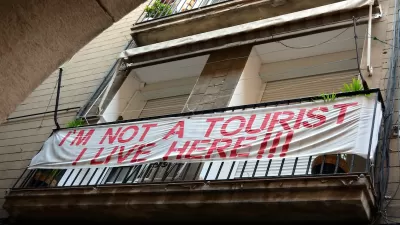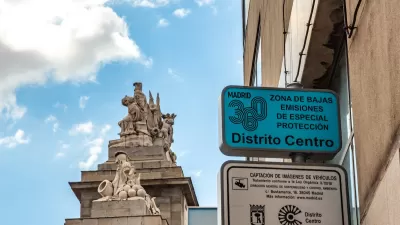Nate Berg says that planners have a crucial role in making sure cities are prepared for natural disasters.
Hazard mitigation necessitates the consideration of the city's social capacity to sustain its citizens immediately following a disaster. Berg states that in order for a city to really be prepared for a disaster like a hurricane or an earthquake, you need to have a safety net of local social services such as emergency care and food and water supplies:
"A city with old buildings that has a strong network of neighbors and an efficient emergency services system will be at less risk of overall damage from an earthquake compared to a city with the same old buildings but none of the social networks or emergency services," writes Berg.
Researchers from the Polytechnic University of Catalonia in Spain argue that cities must plan beyond the physical structure of the city and consider the basic needs of the population by assessing "the number of hospital beds nearby, the training level of hospital staff, the preponderance of marginalized neighborhoods, and rates of crime."
By preparing for events that occur after the disaster, planners can better serve cities and communities by helping them to recuperate. Just as architects build beams to support buildings, planners must organize a social support system to allow for people to carry on after a disaster.
FULL STORY: The Social Side of Urban Earthquake Risk

Alabama: Trump Terminates Settlements for Black Communities Harmed By Raw Sewage
Trump deemed the landmark civil rights agreement “illegal DEI and environmental justice policy.”

Study: Maui’s Plan to Convert Vacation Rentals to Long-Term Housing Could Cause Nearly $1 Billion Economic Loss
The plan would reduce visitor accommodation by 25% resulting in 1,900 jobs lost.

Planetizen Federal Action Tracker
A weekly monitor of how Trump’s orders and actions are impacting planners and planning in America.

Waymo Gets Permission to Map SF’s Market Street
If allowed to operate on the traffic-restricted street, Waymo’s autonomous taxis would have a leg up over ride-hailing competitors — and counter the city’s efforts to grow bike and pedestrian on the thoroughfare.

Parklet Symposium Highlights the Success of Shared Spaces
Parklets got a boost during the Covid-19 pandemic, when the concept was translated to outdoor dining programs that offered restaurants a lifeline during the shutdown.

Federal Homelessness Agency Places Entire Staff on Leave
The U.S. Interagency Council on Homelessness is the only federal agency dedicated to preventing and ending homelessness.
Urban Design for Planners 1: Software Tools
This six-course series explores essential urban design concepts using open source software and equips planners with the tools they need to participate fully in the urban design process.
Planning for Universal Design
Learn the tools for implementing Universal Design in planning regulations.
Caltrans
Smith Gee Studio
Institute for Housing and Urban Development Studies (IHS)
City of Grandview
Harvard GSD Executive Education
Toledo-Lucas County Plan Commissions
Salt Lake City
NYU Wagner Graduate School of Public Service





























